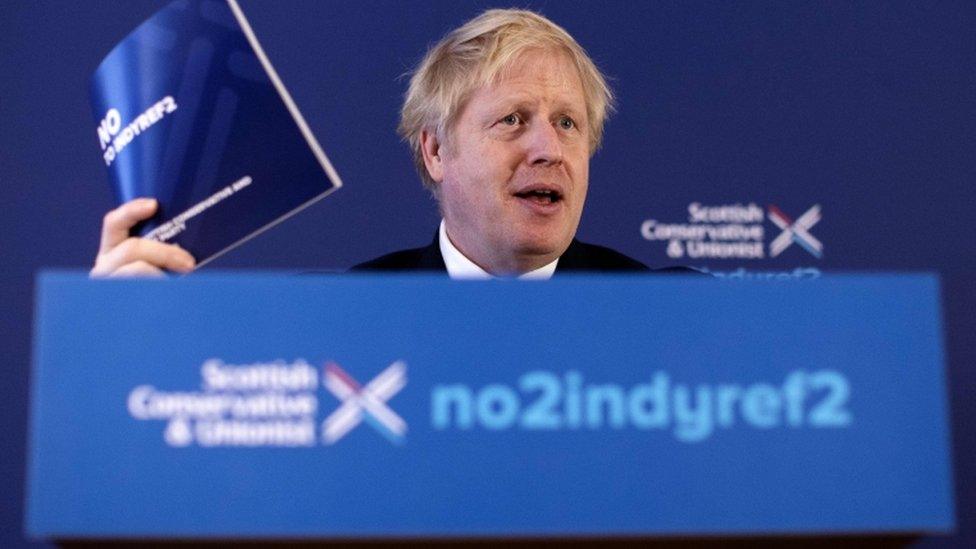Interpreting Nicola Sturgeon's subtle speech
- Published
Nicola Sturgeon: Independence referendum must be 'legal and legitimate'
I'm told that Nicola Sturgeon worked long, hard and personally on her address to an SNP rally in Edinburgh today. She finessed the content until the moment of delivery.
It showed. This was a subtle speech, designed partly to placate restless elements in her party and partly to reconfigure the campaign for independence.
External critics say her statement was void of content, that it contained little in the way of practical proposals.
I understand the origin of these comments but I feel that they misinterpet the nature of Ms Sturgeon's endeavours.
Firstly, be clear that this was a party speech, to a party audience, with a party purpose (albeit with interlopers from the wicked media to ensure wider distribution).
The choreography was as careful as always at an SNP event. Peter Murrell, chief executive and the FM's husband, fussed with his customary good nature.
The front row was partly hand-picked, with last-minute reshuffling directed by Fergus Mutch, the affable, bearded head of communications, who departs his post next week.
In that front row, Joanna Cherry, the MP who led successful court challenges against the prorogation of parliament - and has also led more muted questioning of the FM's strategy.

Ms Sturgeon wants her troops to focus on campaigning and winning people over, not process
Ms Cherry and others have suggested that there should be a consultative plebiscite in Scotland, even in the absence of sanction from the UK government.
Until today, Ms Sturgeon had largely resisted that notion. With today's party address, she quite deliberately gave a little ground. With comparable deliberation, she restricted the acreage of that ground.
She completely ruled out what she called a "wildcat" referendum, without any statutory or legal footing. While voicing empathy for the people of Catalunya, she said the unofficial referendum there was not a route for Scotland to follow.
To be clear, that is not the proposition under scrutiny. Rather, the suggestion is that the extent to which such matters are reserved by the Scotland Act 1998 might be tested in the courts.
The Act explicitly reserves the constitution to Westminster. But would that, inquires Ms Cherry and now, sotto voce, Ms Sturgeon, completely bar a consultative, non-binding plebiscite?
Placating the party
Ms Sturgeon's verdict? Mebbes aye, mebbes naw. That would depend upon judicial opinion.
So she is contemplating the prospect. She does not rule it out. She acknowledges it might - stress, might - be technically feasible.
All part of a clear attempt to placate Ms Cherry and others in the party who are restless. During the speech, Ms Cherry nodded in polite appreciation at the acknowledgement of her position.
But be clear also. Ms Sturgeon is not advocating this course of action, at least not at this stage. She is not preparing the papers for a court action. She notes, bluntly, that it might advance the cause of independence - but it might also set it back.
Rather, she wants the party to avoid an "arid and bitter" argument about process, focusing instead upon a revived campaign to persuade sceptics about the merits of independence.

Boris Johnson remains firmly opposed to a new referendum
For the party, that will be supported by additional funding. In government, there will be policy papers which attempt to answer questions from the public.
Together with a request to the Electoral Commission to retest the 2014 question - which ministers had previously resisted - and an attempt to revive the cross-party spirit and substance of the Constitutional Convention.
In essence, Ms Sturgeon is asking her party to shun disquiet, to forget internal arguments - and to look outwards to those in Scotland who are yet to be convinced by the post-Brexit case for independence.
It was an argument for patience. But not for lethargy. Rather, she wants energy redirected into pursuing independence, answering and rebutting the concerns and anxieties of the public. Which she characterised as legitimate and understandable.
Unionist endeavours
Will any of this convince Boris Johnson to concede an early, statutory referendum? No. He will focus upon the trade negotiations which follow Brexit Day.
Further, he reckons that it is in his party's interests to depict themselves as the stalwart defenders of the Union. Expect more UK government endeavour to rebadge spending and initiatives which impact upon Scotland in order to stress their UK origins.
To be clear, again, Ms Sturgeon told me insistently that she had not abandoned the notion of a referendum this year, despite the apparently medium to long term nature of some of her pronouncements.
However, she was not rigid on timing, any more than she was on process. Could be this year, could be next. In practice, is this perhaps now an issue to reconsider after the Holyrood elections in 2021?
Instead, she wants the SNP - as a party, as a campaign force, as a government - to focus on preparation. For whenever the challenge comes.
